Many Russian studies programs have engendered serious academic ignorance – regarding Ukraine and its neighbours: Tomasz Kamusella, New Eastern Europe, August 11, 2023
Update: A Jan. 28, 2024 Toronto Star article is entitled: “Two years after reopening from the pandemic, is Toronto’s theatre sector on the brink of a crisis?: Unless there’s a turnaround, arts leaders say the city’s once-thriving sector could become a shell of its former self.”
An excerpt reads:
Canada’s largest repertory theatre company, the Stratford Festival, said that 2023 was a “very successful” season, though it’s not yet back to pre-pandemic levels. “We are heading into 2024 with optimism,” said executive director Anita Gaffney. The festival did not provide exact attendance figures, but said they will be available later in the spring.
*
On September 23, 2023, I attended a Meighen Forum panel discussion in Lazaridis Hall at the Tom Patterson Theatre in Stratford, Ontario. The panel, which I found of much interest, addressed the responses of Ukrainian playwrights and artists to the current war in Ukraine.

September 25, 2023, Lazaridis Hall, Tom Patterson Centre. In background on left (behind the trees) is the William Allman Memorial Hall – on Morenz Drive facing the theatre property. Jaan Pill photo
After the panel, I began reading about how Russian studies programs in the West have responded to Russia’s full-scale invasion of Ukraine. Like many people, I’ve also been reading news reports about Nazi veterans from Ukraine who settled in Canada after the Second World War.
At the current post, I will speak about an August 11, 2023 New Eastern Europe article entitled: “Going native: Russian studies in the West.”
The subtitle, of the article that I’ve chosen to highlight, by Tomasz Kamusella, reads:
The West’s endorsement of Russian imperialism comes in different forms, sometimes taking on the guise of “Eastern European studies” in renowned centres of learning
Tomasz Kamusella’s published works include, among others, The Politics of Language and Nationalism in Modern Central Europe (2012) and a chapter, “The Rise and Dynamics of the Normative Isomorphism of Language, Nation, and State in Central Europe,” in The Battle for Ukrainian: A Comparative Perspective (2017) edited by Michael S. Flier and Andrea Graziosi.
Russian imperialism
Imperialism comes in many forms – among them, the imperialism of the British empire. As well, we can speak of French imperialism during the Napoleonic era.
Each empire in history concerns itself with power, domination, and public relations – which can take many forms including, for instance, literary canons and characteristic forms of architecture – aimed at both imperial self-expression and domination.
We can, as well, speak of American imperialism – we can also refer to a de facto American empire.
And, the current post concerns the history of the Russian empire.
With regard to the concept of a Russian empire, Kamusella argues that a number of Western scholars have chosen to endorse Russian imperialism.
In his article, he outlines a configuration of forces which has given rise to such a situation – and suggests what can be done to reverse such a state of affairs.
The article in New Eastern Europe underlines that the endorsement of Russian imperialism is a feature of “Eastern European studies” in a good number of “renowned centres of learning.”
According to Kamusella, scholars in such academic centres have on occasion convinced Western publics that the countries of Central and Eastern Europe are “artificial” and as such belong to Russia’s sphere of geopolitical influence.
He also speaks of a focus at such centres of learning on a “great Russian literature” – “whose greatness one is permitted neither to question nor analyze.”
Kamusella describes, as well, views – for example, assessments regarding standard canons of Russian literature – shared among researchers that he met during a summer visit to a research institute in Japan.
The views were freely shared in private discussions – but that is where the sharing stopped. The scholars, that is, “who discussed this unnoticed socio-culturally stunted and imperialist character of Russian – or rather, Russian-language – literature and culture did not want to go public with this discussion and its conclusions.”
Research in 2022 at Hokkaido University in Sapporo, Japan
Kamusella describes a summer research visit to Hokkaido University in Sapporo, Japan at the Center for Slavic-Eurasian Research (SRC). Each year, the SRC invites scholars who specialize in the history, culture, and politics of Central and Eastern Europe, and of Northern and Central Asia.
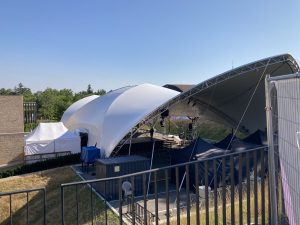
August 14, 2021, theatrical tent installed in parking lot at east end of Tom Patterson Theatre site when performances were being held outdoors in response to the COVID pandemic. Jaan Pill photo
Kamusella speaks of conversations with other scholars who were visiting the SRC in the summer of 2022.
The conversations shared the view that “The classical canon of Russian belles lettres [Oxford Languages: essays, particularly on literary and artistic criticism, written and read primarily for their aesthetic effect] is popularly lauded for its supposedly universal reflection on the human condition. Yet, this canon’s scope and the literature’s selection of characters are extremely narrow, and even bigoted.”

August 14, 2021, theatrical tent installed in parking lot at east end of Tom Patterson Theatre site. Jaan Pill photo
Despite the reality, however, that “tsarist Russia was an extremely polyethnic and multi-confessional empire, classical Russian literature focuses exclusively on the Russophone and Orthodox subset of the Russian nobility.”
This subset comprised a quarter of the empire’s nobles, or about half a million people. This amounts to 0.3 percent, Kamusella notes, of the empire’s population: 166 million in 1914.

September 25, 2023, parking lot where theatrical tent was located during the summer of 2021. Jaan Pill photo
During the Soviet period, the situation did not improve markedly. The characters depicted in “socialist realism” literature of the era were almost exclusively ethnic Russians, “who sang the praises of the Bolshevik revolution and the leading role of the country’s communist party. If an ethnic non-Russian had a colonial-like walk-on in a novel or poem, he almost certainly spoke in Russian.”
In the Soviet Union, all citizens were required to speak and write in Russian, the article notes. Ethnically non-Russian Soviet authors were required to write in Russian when composing literary works.
Thus it came to pass that “Soviet literature was unabashedly and essentially devoted to things Russian, posed as ‘universal’ and ‘humanistic.’”
It also happened that “Ideology and political needs deprived Soviet writers of agency and made them into centrally planned and state-controlled ‘engineers of souls'”.
During his conversations in Sapporo, Kamusella learned that his colleagues largely agreed with this diagnosis of Russian literature and culture – and added that little had changed since the end of communism and the breakup of the Soviet Union.
Scholars did not want to go public with their views
But the scholars did not want to go public with their thoughts. For example, they did not want their names to be associated online with the expression of such views.
“This reluctance was striking and at first hard to grasp in the context of Russia’s barbaric war, marked — as we learned this summer [I assume the reference is to 2022] — with the genocidal massacres in Bucha and Irpin or the razing to the ground of the port city of Mariupol. With a single exception, none of these scholars were Russian citizens. In fact, the one who was a Russian citizen turned out to be more forthcoming than the rest — he condemned the war in no uncertain terms and, to my knowledge, left Russia.”
At the beginning of Russia’s full-scale invasion of Ukraine, “the Kremlin sketched out its neo-imperial plan of subjugating Ukraine by erasing its name from the map of Europe, liquidating the Ukraine elite in death camps, incarcerating Ukrainians in forced labour concentration camps to convince them that they were ‘Russians’, reclaiming all Ukrainian heritage deemed of value as ‘Russian’, and by destroying the Ukrainian language and culture by burning all Ukrainian-language libraries and books.”
Instead of protest, however, among Western scholars, “appeals for impartiality were voiced.”
Such an approach, Kamusella observes, “would have been unthinkable if applied to the cases of genocide and total war from twentieth-century European history. After all, no authorities appeal for more understanding of the arguments of German and Austrian Nazis as to why they chose to exterminate the Jews and Roma.”
Talking further with fellow researchers in Sapporo in 2022, Kamusella learned that the “myopically Russia-oriented or even pro-Russian nature of the field prevented my interlocutors from doing the decent thing beyond the already ritualised but rather toned-down and semi-private condemnation of the Kremlin and ‘its’ war in Ukraine.”
For the researchers who were reluctant to speak out, the article notes, their hopes and fears “revolved around research on Russia and Russian language teaching. All the scholars unconsciously became professionally or even emotionally dependent on the Russian Federation and its institutions, no matter how horrible and inhumane the Kremlin may be in its deeds and decisions.”
Further, “This phenomenon exists as if doing research on Soviet and Russian (at least tsarist) history were not possible in any other post-Soviet country or a post-communist polity, which used to be a colony in the Russian Empire.”
There were, in such comments a “singular insistence on Russian language and culture, as if Armenian, Estonian, Kyrgyz, Ukrainian or Uzbek were not official republican languages in the Soviet Union.”
“The scholars appeared,” as well, “not to recognise that belles lettres and historical documents abound in other tsarist and Soviet bloc official languages. For example, both in tsarist Russia and in the Soviet bloc, German and Polish belonged to this group of languages.”
Circumscribed focus on Russian language and culture
In decades past, the article notes, there was a “circumscribed focus on the Russian language and culture, alongside social relations and politics as conducted among and by ethnic (that is, Slavophone and Orthodox) Russians, or Russkiie (Русские) in the medium of Russian.”
Such an approach was popularly known as Sovietology or Kremlin watching. The original goal of the Sovietologists, according to the article, was in “containing the Soviet Union, the Soviet bloc countries and other communist countries allied with Moscow or communist China.”
However, “many scholars in the field became unreflectively invested in the subject of their research, increasingly fondly referred to with the historically and demographically incorrect shorthand ‘Russia'”.
Such a shorthand meant that researchers tended to limit their gaze “to the Soviet empire’s ethnically Russian metropolis, while their Soviet chaperones restricted their study and conference trips even more to the communist polity’s two largest and ethnically Russian cities, namely Moscow and Leningrad (St Petersburg).”
Kamusella refers to a maverick Soviet scholar, Andrei Amalrik, who proposed that the Soviet Union may not survive beyond the Orwellian year of 1984. This observation did not get much traction among Sovietologists as the prevailing assumption was that the Soviet Union would remain intact for generations to come.
After the collapse took place, most Sovietologists were in “a rush to ‘save’ their field in view of the disappearance of its research subject matter.”
Reinvention of Sovietology
In the process, they did not turn to subject areas such as postcolonial studies, which would be posited on viewing the erstwhile Soviet system as a “de facto Russian empire.”
Instead, Sovietologists “reinvented themselves as researchers in the parallel, overlapping and usually newly-formulated fields of nationalism, post-communist and post-Soviet studies, but symptomatically with a clear-cut spatial focus on Russia, alongside Central and Eastern Europe, with Central Asia (or even ‘Eurasia’) added as an afterthought.”
During this transition, the researchers engaged in what Kamusella describes as a “makeshift approach” to organizational matters: “As a result, many extant or newly founded institutes of Soviet or communist studies received torturously long and confusing new names with unpronounceable acronyms.” Such changes also affected the titles of leading Sovietology journals and the names of well-established Sovietology institutions.
These changes did not change the research focus, however, Kamusella notes. “These variously rebranded institutes of Slavic, Central and Eastern European, Post-communist, Nationalism, and Eurasian Studies,” he comments, “in most cases continued to be focused on the Russian language and culture as practised in the Russian metropolitan centres of Moscow and St Petersburg.”
As well, some research institutions “began entering partnerships with the Kremlin’s eponymous foundation, established in 2007.”
Upcoming congress may (possibly) signal a change in direction
The article refers to an upcoming congress, on the topic of decolonization: “Belatedly but hopefully, the forthcoming 2023 congress of the Association for Slavic, East European, and Eurasian Studies (ASEEES) promises a clear break from cosying up to the Kremlin and Russian oligarchs’ corrupt money over the three decades since the fall of communism.”
In summing up, Kamusella comments:
Perhaps soon, if an institution or journal wishes to continue focusing on things Russian, its field will be announced with a clear label of Russian and Soviet imperialism. Likewise, Central and Eastern Europe (including the Caucasus) will be subsumed under the clear-cut rubric of European studies. And if a country, like Ukraine, is at long last given the attention it deserves, the obvious choice of a name is either Ukrainian studies or Ukrainian history and politics. Similarly, the obfuscating designation of Slavic studies should no longer serve to conceal the intended focus on Russian language and culture. A genuine department of Slavic studies needs to offer fully fledged study tracks in other Slavic languages than Russian.
I believe that in light of the Russian war on Ukraine, which is of existential significance for democratic Europe, the Ukrainian language and culture must be given priority. European and Western help for Ukraine and close cooperation with this country will be fully achieved only when the NATO soldiers, EU officials and Western scholars responsible for these ties are able to communicate with their partners in fluent and idiomatic Ukrainian, with full awareness of Ukrainian literature, culture and history.
Additional resources – Toronto Public Library
Some additional resources include:
George Orwell and Russia (2023) by Masha Karp.
A blurb reads:
For those living in the Soviet Union, Orwell’s masterpieces Animal Farm and Nineteen Eighty Four were not dystopias, but accurate fictional descriptions of reality. Here, the Orwell scholar and Russian political expert Masha Karp – head of the BBC’s Russian Service for nearly a decade – explores how Orwell’s work was received in Russia, and how it affects the political reality of totalitarianism today. The book reveals for the first time new contextual articles written by Orwell which provide explanation for his naming of fellow communists to the authorities in the 1940s, and shows how Orwell’s ideas percolated in Russia even under censorship. Karp also demonstrates why The Road to Wigan Pier – Orwell’s famous exploration of British poverty – was never published in Russian, and how the ideas of totalitarianism laid out in Orwell’s writings have taken root in Russia today. As Vladimir Putin’s actions continue to shock the west, it seems clear we are witnessing a new transformation of totalitarianism, as predicted and described by Orwell. Now over 70 years after Orwell’s death, his writing, at least as far as Russia is concerned, remains as timely and urgent as it has ever been.
The Toronto Public Library has also compiled a
Background on Russia and Ukraine
An entry at the Toronto Public Library website notes: “These books and resources will help you understand the history of the region and context for the current crisis.”



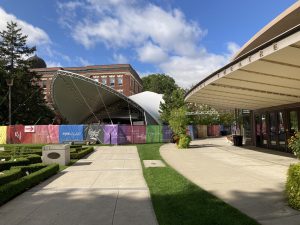
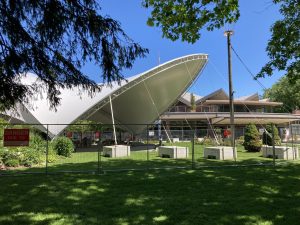
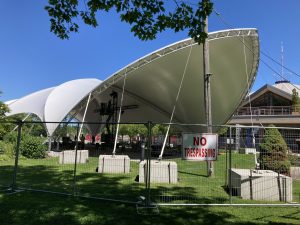
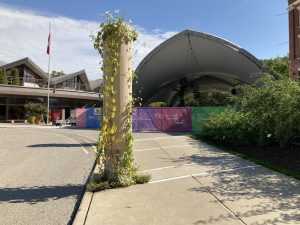
George Orwell
In this note I share a more complete list of resources related to George Orwell.
My understanding of the distinction between far left and left has been appreciably advanced as a result of reading Why Orwell Matters (2002) by Christopher Hitchens.
Hitchens addresses this distinction in Chapter 2, “Orwell and the Left” – and throughout the rest of this fine study as well.
I highly recommend the essay/biography by Hitchens along with other books by and about George Orwell. Resources include:
List of books and other resources about Orwell – Stratford Public Library
List of books and other resources about Orwell at Toronto Public Library
George Orwell, 1903-1950 – Toronto Public Library (a more concise list)
George Orwell – Criticism & Interpretation – Toronto Public Library
Why Orwell Matters (2002)
Wifedom: Mrs. Orwell’s Invisible Life (2023)
Orwell’s Roses (2021)
George Orwell, 1903-1950 – Homes and haunts – Toronto Public Library
George Orwell and Russia (2023)
A Sept. 11, 2023 New Eastern Europe article is entitled: :Orwell’s warning of totalitarianism for today: A review of George Orwell and Russia. By: Masha Karp, published by Bloomsbury Academic.”
An excerpt reads:
Karp’s book, George Orwell and Russia, answers this question. It is published in the context of Vladimir Putin’s full-scale attack on Ukraine, which has made the question on Orwell brutally pertinent. The similarities between today’s Russia and Orwell’s Oceania are overwhelming. Putin’s dictatorship is killing thousands of people and razing cities in a war that cannot be called a war, as it was launched for spurious reasons. As Karp observes, the Russian state is sinister and absurd.
A leading Orwell scholar and a translator of Animal Farm into Russian, Karp points to key figures who influenced the young Eric Blair’s views. They include his mother’s eccentric sister Aunt Nellie, a communist and enthusiast for the international language Esperanto. In 1923, in her early fifties, she met Eugene Lanti, the founder of a global Esperanto association. Its aim was to overthrow the capitalist order. Lanti visited Petrograd full of radical fervour. He was disappointed by what he found: poverty, prostitution, bureaucracy and a Bolshevik ruling class. By the late 1920s he concluded that Moscow was uninterested in a progressive world revolution. It wanted to promote the “national state” interests of Stalin’s dictatorship. The USSR had become a nightmarish “prison”, he told Orwell, who at the time was inclined to believe it represented definitive socialism.
Background on Russia and Ukraine – Toronto Public Library